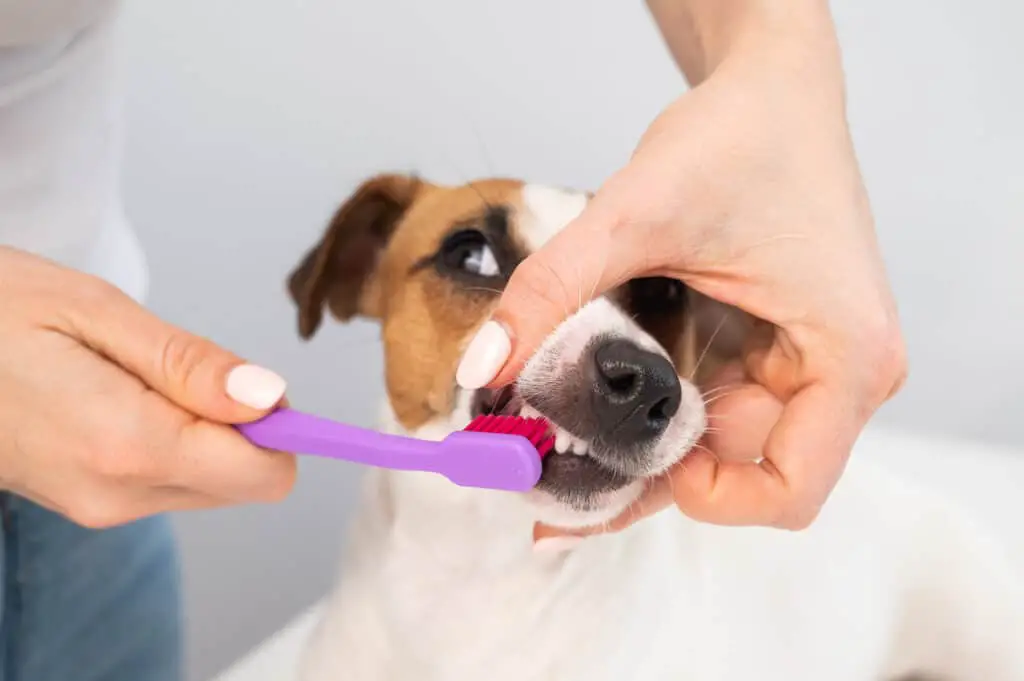It is important to look after your Jack Russell Terrier’s oral health as infections not only cause pain but can lead to tooth loss, and expensive veterinary bills for treatment and extraction.
Studies show that Jack Russell Terriers are more likely than other breeds to have problems with their teeth. This is alarming when you consider that upwards of 80% of all dog breeds have chronic dental disease by age two.
Inflammation in the mouth can impact general health and if left untreated teeth problems can even lead to organ failure.
Common tooth and mouth problems in Jack Russell Terriers
Bad breath in Jack Russell Terriers is often a warning sign of oral health issues.
The most common problem seen in Jack Russell Terriers is Periodontal disease. Tooth decay is rare for terriers, representing less than 10% of all dental problems. Other problems include:
- Plaque
- Tartar
- Gingivitis
- Halitosis
- Pyorrhea
What is Periodontal Disease in Jack Russell Terriers?
Periodontal disease starts tartar; the brown gritty, solid looking substance building up around the base of a Jack Russell Terrier’s teeth.
Tartar causes inflammation and often progresses to an infection of the gums and roots of the teeth. This can all happen quickly and is the main cause of your terrier’s bad breath.
If left untreated, your Jack Russell Terrier will lose teeth and be in danger of damaging their kidneys, liver, heart, and joints. In fact, your terrier’s life may be cut short by up three years!
How do I know if my Jack Russell Terrier has dental disease?
There are 7 tell-tale signs of dental disease to look for in Jack Russell Terriers.
1. Bad breath
Does your Jack Russell Terrier have bad breath?
Sometimes a terriers habits translate directly into bad breath. For instance, if they regularly get into the garbage, or have access to decomposing animal remains, then their bad breath could be the result of unsupervised snacking. While bad breath (also known as halitosis) can be result from your terrier eating undesirable things, it is commonly an indicator of some form of dental disease.
If your terrier has bad breath, plaque may have started to develop. The build-up of plaque, which often contains sulphur-based proteins, leads to an accumulation of bacteria that causes bad breath, leading to dental disease.
It is important to keep in mind that bad breath can signify that your terrier has a serious health issue like diabetes, kidney, or liver disease. If you are thorough with their oral care and the smell of their breath is still unbearably bad; it might be worth having them check by your vet.
2. Plaque and tartar build up on the teeth
A healthy Jack Russell Terrier’s teeth should be pearly white in colour.
Within a few hours of eating, a gummy substance forms on teeth and within 24 hours as this substance combines with salts in the saliva it hardens to form plaque. As plaque accumulates and mineralises, it eventually transforms into visible hard brownish-grey substance material called tartar.
Tartar traps bacteria around the surface of your dog’s teeth causing them to develop infected and gums.
3. Gum redness or inflammation (gingivitis)
The presence of red or inflamed gums is a good indicator of gingivitis. Gingivitis is caused by bacteria that accumulates around the teeth due to plaque and tartar build-up.
The early stages of gingivitis are quite treatable. As this condition progresses, the inflammation of the gums may become more severe and painful, and the gums may even start to bleed.
If left to progress, gingivitis can develop into periodontal disease, which can lead to tooth loss.
4. Loss of appetite and difficulty chewing food
Loss of appetite and difficulty chewing food can be a sign that dental disease is causing oral discomfort.
A good indicator of this is when a Jack Russell Terrier struggles to chew dry food or favors chewing on one side. This in turn affects their appetite and desire to eat.
5. Discomfort or bleeding around the mouth
While this is an indicator of gingivitis, discomfort and bleeding around the mouth may be due to the growth of oral tumours, such as epulis.
These may be hard to spot unless they’re in the front of the mouth but if you find a lump anywhere in your Jack Russell Terrier’s mouth take them for a check-up immediately as these may be malignant.
6. Swelling under the eyes
Swelling under the eyes is often an indicator of a severe infection around the root of the tooth called a tooth abscess. An abscess originates from bacteria entering a diseased or fractured tooth.
As pus begins to surround the diseased tooth, it causes swelling under the eyes. One of the most common causes of abscessed teeth include: Periodontal disease.
7. Pawing at the mouth
Since Jack Russell Terriers can’t talk, we have to make do with interpreting their body language or observing their actions.
A terrier pawing at their mouth or rubbing their muzzle on the ground could be a sign that they’re experiencing pain, discomfort, or irritation in their mouth due to dental disease.
How to keep your Jack Russell Terrier’s teeth clean
Jack Russell Terrier dental care is neither expensive nor difficult. Just like grooming or nail clipping, it is an important part of your terrier’s regular care.
Preventive care is far less expensive than remedial dog dental care. Here are some things you can do at home to help keep your Jack Russell Terrier’s teeth squeaky clean.
1. Brush your Jack Russell Terrier’s teeth
Brushing your Jack Russell Terrier’s teeth is probably the most effective thing you can do to prevent dental disease and tooth decay. Brushing removes and prevents plaque and tartar build up and keep your terrier’s dental health in tip-top shape.
The best time to start getting your terrier used to having their teeth cleaned is when they are a puppy. Getting into the habit early means you are regularly inspecting their teeth and mouth and they are used to teeth cleaning for later when it is needed. However, this doesn’t mean you can’t begin with an older terrier, it may just take a little longer for them to become comfortable having their teeth brushed.
It is important to choose the right toothbrush and dog-specific toothpaste. These can be easily found at all good pet stores. Never use human toothpaste – it’s toxic to dogs. Start with just a few brush movements on the top and bottom teeth and gradually build up to brushing all their teeth. Daily brushing is ideal but even once or two a week will still be effective.
Don’t feel discouraged if this takes a few weeks for your terrier to get used to having their teeth brushed – many dogs and puppies need to be started slowly. The brushing is an odd sensation for them but with a little positive training you’ll be able to brush your dog’s teeth without issue.
2. Utilize dental chews
Dental chews are made specifically to clean your Jack Russell Terrier’s teeth and are one of the easiest and most effective ways to improve your terrier’s dental health. In fact, they are almost as effective at cleaning a dog’s teeth as brushing with a toothbrush and toothpaste.
The chewing action helps to reduce tartar by up to 80% and supports gum health and they are filled with ingredients to help prevent further build-up. Most Jack Russell Terriers find them to be a delicious treat, and some are long-lasting to keep their minds occupied for a while too.
Be careful when considering the quality of the dental chew, many products contain questionable ingredients, or excessive fat or calories.
3. Feed your Jack Russell Terrier quality food
Ensuring your Jack Russell Terrier has access to high-quality, healthy food is an excellent way to keep their oral health in check. Poor-quality foods will increase plaque and tartar build-up on your terrier’s teeth and negatively impact their dental health and immune system.
Look for whole foods with natural ingredients that contain enzymes and other supplements that help break down unwanted build-up on teeth and avoid ingredients like grains, by-products and meals that are not only unhealthy but stick to your dog’s teeth.
It is important to remember that even Jack Russell Terrier’s fed natural diets should have their teeth brushed and dental health checked regularly.
4. Chew toys
Chew toys are designed to be safe for your Jack Russell Terrier’s gums, help to clean their teeth and protect them from oral diseases. Rubbing their teeth against the surface of the chew toy helps to scrape away plaque from their teeth, which prevents the accumulation of hard tartar. Giving your terrier a variety of textured chew toys can also exercise their jaws.
Avoid giving your terrier hard chew toys as this can cause more damage than good and actually wear down their teeth. Bones, although natural, may seem a good option, but can also wear their teeth down.
5. Regular veterinary check-ups
Regular dental checks by your veterinarian are essential for maintaining your Jack Russell Terrier’s healthy teeth and gums. This becomes increasingly important as your terrier ages.
Your veterinarian will be able to provide treatment options such as a professional scale and polish if your dog already has dental problems.




![How Much Exercise Does A Jack Russell Terrier Need? [Complete guide for all life stages]](https://jackrussellsunleashed.com/wp-content/uploads/2022/03/iStock-1143749718-1024x683.jpg)
![My Jack Russell Terrier Hates Baths! [4 reasons why & 5 helpful bath time tips]](https://jackrussellsunleashed.com/wp-content/uploads/2022/03/iStock-613556174-1024x683.jpg)
